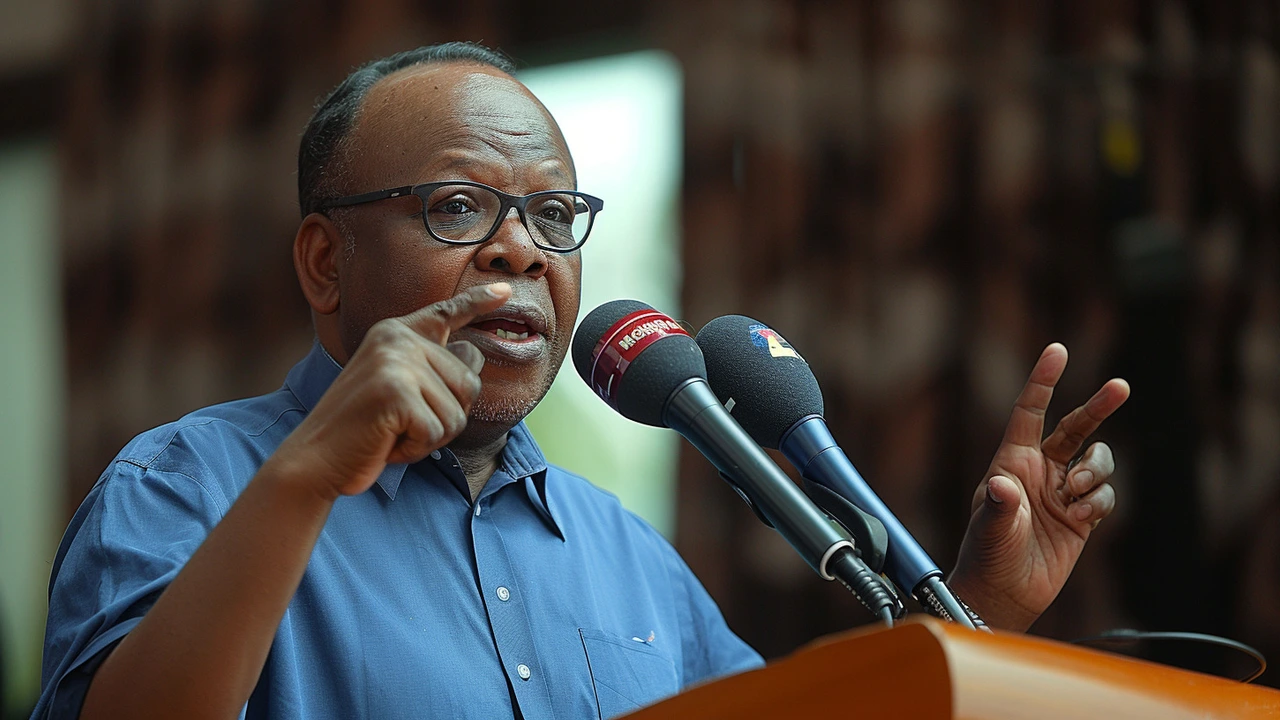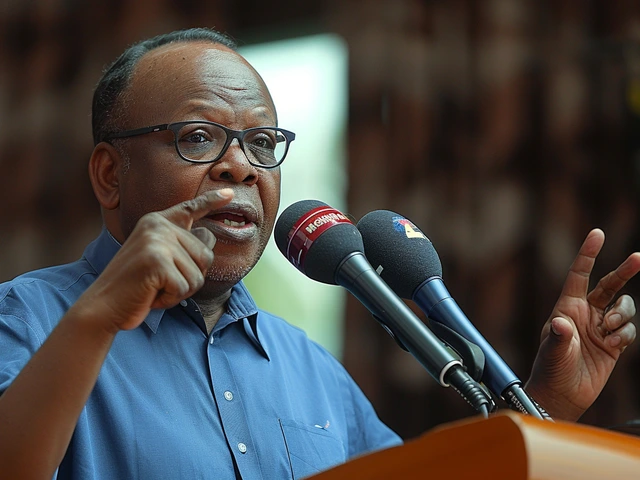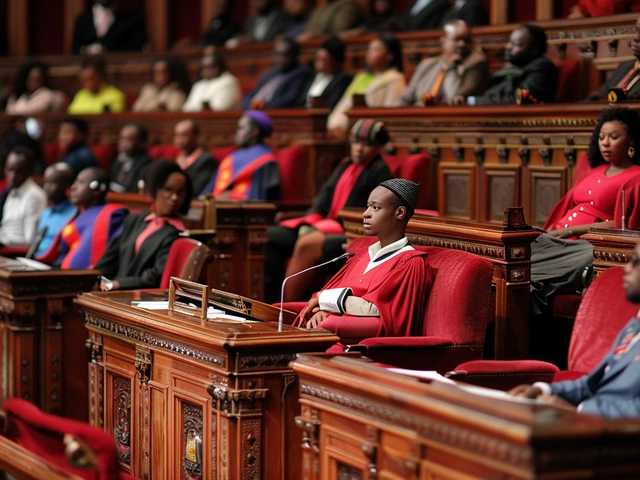
ASUU Criticizes Government Over Lack of Governing Councils in Universities, Calls for Action
The Academic Staff Union of Universities (ASUU) has expressed deep concerns over the government's failure to reinstate or reconstitute governing councils in public universities. This issue, ASUU claims, is causing a series of illegalities and undermining the autonomy of higher education institutions in Nigeria. The criticism was made clear during ASUU's National Executive Council (NEC) meeting, held at the prestigious Obafemi Awolowo University in Ile-Ife, Osun State, between May 11 and May 12.
Prof. Emmanuel Osodeke, the union's president, stated firmly that the NEC had meticulously reviewed the status of ASUU's ongoing engagements with both federal and state governments. The primary goal of these engagements has been to reposition Nigeria’s public universities to ensure they can compete globally. However, the union has noted a recurring issue - the apparent refusal or delay by both federal and state governments to address key unresolved matters. Among these critical issues is the renegotiation of the FGN/ASUU 2009 agreement.
At the heart of this disagreement is the need for a timely reconstitution of university governing councils. According to ASUU, the absence of these councils has paved the way for numerous illegal practices, seriously compromising the autonomy of public universities. This erosion of autonomy is something the union cannot stand by idly and watch. The failure to reinstate these councils undermines the governance structure fundamental to the smooth operation of universities.
Besides the governance concerns, ASUU has also criticized the governments for not addressing the grim living and working conditions that Nigerian university staff and students are subject to. Failed promises and unfulfilled commitments have brought the university system to its knees, exemplified by the prolonged strike that paralyzed academic activities nationwide from February to October 2022. This strike was born out of frustration with the government's failure to meet the union's demands.
The union insists that the federal and state governments must immediately set the wheels in motion to review and sign the Nimi Briggs-led renegotiated draft agreement. This step, ASUU believes, would demonstrate the government's goodwill and commitment to improving the state of public universities. The draft agreement includes critical points that if acted upon, could significantly enhance the efficiency and competitiveness of these institutions.
Delayed actions by the government have not only affected the operational integrity of universities but have also left many issues festering. Public universities are experiencing a significant academic and administrative decay, as sustainable solutions are continuously postponed. The call for reconstitution of governing councils isn’t merely bureaucratic; it’s a necessary step towards restoring order and meeting global standards.
Osodeke's remarks highlighted the lingering dissatisfaction within the union. The NEC's unanimous decision to proclaim their discontent underscores the urgency of the matter. They acknowledged the government's tendencies to engage in dialogue but have emphasized that words without actions are futile. There’s a need for concrete steps that reflect real intent to address the multitude of problems plaguing the universities.
The academic staff have pointed out various adverse effects the lack of governing councils has had on university operations. This includes a decline in transparent decision-making and academic independence, as well as issues in financial management, all of which are integral for a healthy academic environment. The absence of these councils weakens the universities’ overall capacity to govern themselves effectively, leading to numerous operational inefficiencies.
Furthermore, ASUU’s concerns go beyond internal university governance. The union has also highlighted the broader socio-economic environment that affects education. Rising inflation, insufficient funding, and poor infrastructure further exacerbate the difficulties faced by public universities. These factors collectively contribute to a declining standard of education, which in turn affects the nation's progress.
The union emphatically rejected the status quo and warned that failure to act by the government would force them to take decisive action. This could mean another round of strikes or other forms of industrial action. The union gave the federal and state governments a two-week ultimatum to show tangible progress towards resolving the highlighted issues. If not, ASUU plans to reconvene and decide on more severe responses to push for the changes they seek.
As the wait continues, university staff and students remain in a limbo state, hoping that the government will act swiftly. It is a critical time for Nigeria's educational sector, and timely intervention could potentially avert further disruption of academic activities. ASUU's steadfast stance highlights the crucial need for immediate government response to secure the future of public university education in Nigeria.






ASUU’s call for reconstituted councils is a wake‑up for Nigerian legislators, demanding structural overhaul and academic freedom.
Reading through the latest ASUU statements feels like watching a slow‑burn drama where the stakes are the very future of higher education. The union’s frustration is palpable, yet they manage to keep the tone measured, offering a glimpse of hope amidst the chaos. Their demand for governing councils isn’t a petty bureaucratic wish; it’s a foundational pillar for autonomy. If the government finally listens, we might see a renaissance of Nigerian academia.
Indeed, the procedural vacuum has tangible repercussions on research funding and policy formulation. A formal council would re‑establish checks and balances, ensuring transparency. Moreover, it would align with international governance standards, fostering collaborations. The academic community deserves this structural remedy without further delay.
While the emotive articulation of ASUU’s grievances is commendably vivid, one must scrutinize the underlying legislative inertia. The petitionary tone, albeit earnest, skirts the nuanced constitutional prerogatives that delineate federal oversight. Nonetheless, the exigency of restoring autonomous governance structures cannot be overstated; it is a sine qua non for scholarly vigor.
It is profoundly ironic that a union championing educational advancement shall resort to rhetoric that resembles bureaucratic theatre. One might quip that the absence of governing councils has transformed universities into shipless vessels adrift in administrative fog. The satire lies in the government’s promise of reform, yet its actions remain conspicuously inert. Such dissonance warrants a more incisive critique than the usual platitudes.
Yo, fr fr, the gov's just playing chess while our uni's stuck on checkers lol. They talk big about "reforms" but the only thing they re‑form is our patience, which is low af. Some say it's a grand conspiracy to keep power, and honestly, the signs are there-budget cuts, endless delays. Wake up, sheeple, or we'll keep crying "strike" till the walls fall.
ASUU’s push for council reinstatement is a solid step toward restoring academic integrity. It signals a commitment to institutional accountability. Let’s hope the momentum translates into concrete policy changes soon.
One might argue that invoking the spirit of reform without tangible mechanisms is mere philosophical posturing. The union's intent, while noble, must be anchored in pragmatic frameworks lest it dissolve into rhetorical echo.
💡 Wow, this is huge!! 🎉 ASUU finally putting the spotlight on governing councils is exactly what our universities need!!! 🌟 It’s not just about paperwork; it’s about giving our lecturers and students a real voice!!! 🙌 Let’s keep the energy high and push for action!!! 🚀
Oh, the optimism is refreshing, if a bit naïve. While the fervor is admirable, the bureaucratic machinery rarely moves on sheer enthusiasm alone. Expect a slow grind before any substantive change materializes.
Enough with the polite pleas! ASUU needs to unleash its full fury and put the government on notice. If they don’t act now, the next strike will be unstoppable and far more disruptive than anything seen before.
Chill, man. Throwing fists might get attention, but it could also burn bridges we need later. A balanced push, with clear demands and transparent timelines, could keep the dialogue open while still showing seriousness.
I get that the union’s frustration is real, but we should also consider the broader economic constraints the government faces. Maybe a phased approach to council reinstatement could be more feasible, aligning with fiscal realities.
Absolutely, the synergy between fiscal policy and academic governance is vital. Leveraging public‑private partnerships could accelerate council formation while mitigating budgetary pressure. Let’s incorporate these strategic levers into the negotiation matrix.
ASUU's patience is wearing thin.
Patience? That’s a luxury only the elite afford! 🚨 The government's deliberate stalling is a calculated tactic to weaken our institutions, and we must expose this agenda now!!! 📢 Immediate action is non‑negotiable!!!
The chronic absence of governing councils in Nigeria’s public universities represents more than an administrative oversight; it is a systemic erosion of institutional autonomy.
When academic bodies lack a legitimate decision‑making apparatus, the susceptibility to political interference escalates dramatically.
This interference, in turn, compromises curriculum standards, research priorities, and resource allocation, undermining the very mission of higher education.
Moreover, the vacuum created by missing councils fosters an environment where financial mismanagement can thrive unchecked.
Stakeholders, from faculty to students, experience a palpable decline in confidence toward university leadership.
The resultant disillusionment often manifests in protests, strikes, and a brain drain that depletes the nation’s intellectual capital.
International collaboration suffers as foreign partners question the reliability of partner institutions without transparent governance.
Domestically, the lack of oversight hampers the implementation of innovative teaching methods and the adoption of technology.
Consequently, graduates enter the workforce ill‑prepared for the demands of a rapidly evolving global market.
Reinstating councils would re‑establish a critical feedback loop between academia and policy makers, ensuring that reforms are both contextually relevant and practically feasible.
It would also restore merit‑based appointments, enhancing the credibility of administrative decisions.
By aligning governance structures with global best practices, Nigeria could revitalize its research output and attract investment.
The urgency is amplified by the current economic challenges that make efficient university management indispensable.
Ultimately, a functional governing council is the cornerstone upon which a resilient, competitive, and socially responsible university system must be built.